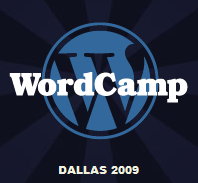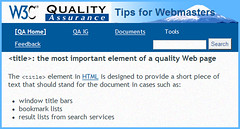Google Image Search – Second Only To Web Search In Size
This post is based on the interview between Eric Enge and Peter Linsley, Google’s Product Manager for Image Search. It reveals some interesting aspects of image search which is growing at an accelerated pace.
A recent survey by Hitwise in February 2009 shows Google Image Search as part of the troika of top web properties owned by Google in terms of traffic and revenue.

Possible Related Posts
Posted by Ravi of Netconcepts Ltd. on 07/19/2009
Permalink | |  Print
| Trackback | Comments (0) | Comments RSS
Print
| Trackback | Comments (0) | Comments RSS
Filed under: Best Practices, Google, Image Optimization, Search Engine Optimization, Searching, SEO alt text, auckland search engine optimisation, auckland seo, combating spam in image search, facial recognition software, Google-Image-Search, googlelabs, growth of image search, image search results, image-search, matching image with content, Netconcepts, on page factors in optimising images, ranking of images, signals in html world, signals in image world, similar images, universal search results, web page strength
Domain Diversity – Key Metric For Higher Google Rankings
Domain diversity is an important SEO factor that is crucial for a site in order to rank well on the Google SERPs. This is achieved by the site gaining inbound links from a diverse set of domains. This is a daunting task as it is not easy to get inbound links. The best way to achieve this is for the site to contain top quality content that makes it a standout in the industry in which it operates.
Research done by the experts at SEOmoz indicated (above the 95% confidence level) that domain diversity is a key metric that helps a site achieve top rankings. The diversity here refers to the number of links coming from a variety of root domains to the site in question.
(more…)
Possible Related Posts
Posted by Ravi of Netconcepts Ltd. on 07/12/2009
Permalink | |  Print
| Trackback | Comments (0) | Comments RSS
Print
| Trackback | Comments (0) | Comments RSS
Filed under: Best Practices, Link Building, Search Engine Optimization, SEO anchor text, auckland search engine marketing, blog integration, consolidation of links, domain authority, domain diversity, domain trust, inbound links, metric for higher google rankings, microsites, Netconcepts, topical focus
Search Engine Crawling and Indexing Factors
The post today is about getting a site crawled and indexed effectively by the major search engines. It can be frustrating for a site owner to find that her newly built site with bells and whistles is just not appearing on the Google SERPs for a search query relevant to her business.
It is a good idea to have some knowledge of the factors that influence the crawling of a site and its successful indexing before the site ranks on the SERPs. The site can be built in a user friendly way that allows the spiders to know what to crawl and how frequently to crawl.
(more…)
Possible Related Posts
Posted by Ravi of Netconcepts Ltd. on 07/05/2009
Permalink | |  Print
| Trackback | Comments (0) | Comments RSS
Print
| Trackback | Comments (0) | Comments RSS
Filed under: Search Engine Optimization, SEO, Spiders backlinks, content freshness, crawling factors, domain importance, duplicate-content, external links, Feeds, google-webmaster-tools, increase crawl rate, Links, PageRank, query deserves freshness, search engine crawling, search engine indexing, signals, supplemental index, technical factors, unique content
Natural Search Marketing is Just in Time Conversation
I had the extreme pleasure of presenting to some of the biggest brands around at the 2009 Brandworks University. This year represented 19 years that Lindsay, Stone & Briggs has put on this annual branding conference. Brandworks is very unique in many ways as conferences go: attendance is mostly done by invitation, but attendees still pay a fee to attend; rather than elective presentations running simultaneously, there’s one block and presentations flow back-to-back and are formulated to relate to and support each other as well as the underlying theme; rather than a typical podium setup, presentations are done “in-the-round;” and it isn’t hard to find attendees who are able to claim 5, 10 or more years of attendance. Needless to say, if you ever get the opportunity to attend or are invited to speak, I highly recommend it.
This year’s talk was around the core theme of the “conversation economy” and how marketing, branding, and business in general is being shaped by and around conversations. Not surprising, there was a fair amount of talk around social media. Of course, my portion was to focus on natural search as part of this conversation, which thanks to blended search, crosses over and intersects all marketing channels. While my view on natural search hasn’t changed much over the years, preparing my presentation for the conference helped me frame it up with the exact message phrasing that I’ve been looking for – “just in time conversation.”
Possible Related Posts
Posted by Brian R. Brown of Netconcepts on 07/01/2009
Permalink | |  Print
| Trackback | Comments (0) | Comments RSS
Print
| Trackback | Comments (0) | Comments RSS
Filed under: Best Practices, Conferences, Paid Search, Search Engine Optimization, SEO brands, natural search marketing, SEO
Speaking at Dallas WordCamp 2009
 I’m speaking at this year’s WordCamp in Dallas again later this week.
I’m speaking at this year’s WordCamp in Dallas again later this week.
WordCamp is a mini-convention for WordPress and blogging enthusiasts. Some of the content is WordPress-centric, but other content is applicable to bloggers in general, such as how to promote your blog and other stuff.
I’ll be speaking on how to use social image sharing services for promotion. Social media sites such as Flickr allow people to publish and share their photos with many other people, and the site is well-constructed in terms of search engine optimization, so posting images there helps get media distributed all over. Using Flickr can help one gain more attention, inbound links, and overall search rankings.
I’ve spoken on using Flickr for promotion and optimization before, and I’ve written on details of image optimization here a number of times.
I’d further recommend blogging to everyone – I first started blogging here on the Natural Search Blog as a guest, after Stephan Spencer invited me, and it eventually changed my overall career path. Be sure to check out Stephan’s articles on blog optimization, btw, since he’s pretty much the top authority out there on the subject.
There’s still a few seats left for Dallas WordCamp – sign up before they’re all gone!
Possible Related Posts
Posted by Chris of Silvery on 06/22/2009
Permalink | |  Print
| Trackback | Comments (0) | Comments RSS
Print
| Trackback | Comments (0) | Comments RSS
Filed under: Blog Optimization, Conferences, Content Optimization, Image Optimization, SEO, Social Media Optimization Blog Optimization, blog seo, blogging, dallas wordcamp, flickr, Image Optimization, image SEO, Image-Search-Optimization, SMO, Social Media Optimization, Social-Media, word camp, wordcamp, WordPress
PageRank Sculpting – The Nofollow Debate
At SMX Advanced in Seattle last month, Matt Cutts made his intentions clear when he advised SEOs not to waste too much time on internal page rank sculpting using the nofollow tag and instead concentrate on spending that time on creating useful content.
(more…)
Possible Related Posts
Posted by Ravi of Netconcepts Ltd. on 06/21/2009
Permalink | |  Print
| Trackback | Comments (0) | Comments RSS
Print
| Trackback | Comments (0) | Comments RSS
Filed under: PageRank, Search Engine Optimization, SEO domain rank, domain trust, flowing link juice, information architecture, internal page rank sculpting, nofollow tag, page crawling, page inclusion in google index, page level rank, page level trust, page rank evaporation, pagerank sculpting, pr leak, site architecture
60-Second Website Audit
While your mother may have taught you not to judge a book by its cover, she probably wasn’t an SEO. Mother’s logic is still pretty good to live by, but for as complex as SEO is or may seem, it’s pretty amazing what you can learn about a website’s SEO quality in 60 seconds or less.
Okay, you aren’t going to fully understand the intricate details and you’d obviously spend far, far more time (closer to hours than seconds) on a true site audit, but I’d venture that 60 seconds is enough for a good gut check and for identifying areas that need deep exploration. What may make this most interesting is to compare results that your “team” gets from this exercise since we all have our own approaches, hot buttons, etc.
Possible Related Posts
Posted by Brian R. Brown of Netconcepts on 06/19/2009
Permalink | |  Print
| Trackback | Comments (0) | Comments RSS
Print
| Trackback | Comments (0) | Comments RSS
Filed under: General, Search Engine Optimization, SEO, Tricks Audit, Best Practices, SEO
Microformats Hit Mainstream!
 Over on SEMClubhouse I’ve written up a post on “Why Use Microformats?” which is a mild criticism of Michael Gray’s recent post on “HCards, Microformats and Address Data does it Matter for SEO“. Essentially, Michael suggests people should prioritize implementation of hCard into local info webpages as a lower-priority, back-burner project. I not only believe that Yahoo’s SearchMonkey developer platform and Google’s new Rich Snippets display are proving that the search engines consider the Microformats protocol to be important, but anything presented as a back-burner or rainy-day project for many major corporations pretty much relegates that work to never be done at all.
Over on SEMClubhouse I’ve written up a post on “Why Use Microformats?” which is a mild criticism of Michael Gray’s recent post on “HCards, Microformats and Address Data does it Matter for SEO“. Essentially, Michael suggests people should prioritize implementation of hCard into local info webpages as a lower-priority, back-burner project. I not only believe that Yahoo’s SearchMonkey developer platform and Google’s new Rich Snippets display are proving that the search engines consider the Microformats protocol to be important, but anything presented as a back-burner or rainy-day project for many major corporations pretty much relegates that work to never be done at all.
With the advent of Rich Snippets in SERPs, I think I can safely declare that Microformats have now hit mainstream! (more…)
Possible Related Posts
Posted by Chris of Silvery on 05/20/2009
Permalink | |  Print
| Trackback | Comments (0) | Comments RSS
Print
| Trackback | Comments (0) | Comments RSS
Filed under: Best Practices, Content Optimization, Google, HTML Optimization, Local Search Optimization, Search Engine Optimization, SEO Google, hcalendar, hCard, hproduct, hreview, Local Search, local-SEO, microformats, microformatting, rich snippets, Search Engine Optimization, searchmonkey, semantic code, semantic markup
Key to Relevance: Title Tags
I recently penned an article at Search Engine Land on Leveraging Reverse Search For Local SEO. In it, I describe how in certain exception cases, one may benefit from adding the street address into a business site’s TITLE tag. It’s not the first time that I have mentioned how TITLE tags are key to relevance in Local Search — I’d previously mentioned how critical it is for local businesses to include their category keywords and city names in the TITLE as well.
Yet, a great many sites continue to miss this vital key to relevance, and they wonder why they fail at ranking for their most apropos keywords. Keywords for which they’d otherwise have a very good chance at ranking upon!

W3C calls the TITLE the “most important element of a quality web page” (more…)
Possible Related Posts
Posted by Chris of Silvery on 04/10/2009
Permalink | |  Print
| Trackback | Comments (0) | Comments RSS
Print
| Trackback | Comments (0) | Comments RSS
Filed under: Best Practices, Content Optimization, General, Google, HTML Optimization, Keyword Research, Local Search Optimization, Search Engine Optimization, SEO, Tricks key relevance, Keyword-Positions, Keyword-Rankings, page-titles, SEO, title-tags, w3c
Town Changes Name For Better Google Rankings
This is just too cool to pass up mentioning in local search news: a town in Europe has decided to change it’s name in order to get better rankings in Google!
 The town of “Eu” in France has been edged out of search rankings for the term, since other pages about the European Union are ranking higher. According to them, they’re missing out on a lot of tourism because individuals simply cannot find information about them.
The town of “Eu” in France has been edged out of search rankings for the term, since other pages about the European Union are ranking higher. According to them, they’re missing out on a lot of tourism because individuals simply cannot find information about them.
I’ve previously blogged in Ultimate Local SEO Tactics a tongue-in-cheek post recommending changing a town’s name for search optimization purposes, but I didn’t think it would actually happen!
Now, I’d say they possibly could save some money/trouble by first hiring some SEOs to try to help them rank for the term. For instance, it might be possible to get the Wikipedia page for Eu to rank on the first page.
In fact, I’ll call for a bit of generous community action here – why don’t all you other local SEO’s out there blog about this city and link to their Wikipedia page as well? Let’s help that poor town out!
Possible Related Posts
Posted by Chris of Silvery on 02/26/2009
Permalink | |  Print
| Trackback | Comments (0) | Comments RSS
Print
| Trackback | Comments (0) | Comments RSS
Filed under: Local Search, Local Search Optimization, SEO EU, Local Search Optimization, local-SEO, Search Engine Optimization, SEO

